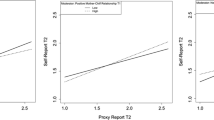Abstract
Inconsistency in parenting is a factor that may influence children’s mental health. A questionnaire, measuring three parental inconsistencies (temporal, situational, and father-mother inconsistency) was administered to adolescents in nine countries to assess its association with adolescents’ psychological disorders. The results show that parental inconsistency varies across cultures. Temporal inconsistency is not correlated with the other two inconsistencies. Temporal and father–mother inconsistencies, but not the situational inconsistency, were associated with adolescents’ psychological disorders. The associations between parental inconsistency and psychological disorders differed across cultures.



Similar content being viewed by others
References
Baumrind, D. (1991). The influence of parenting style on adolescent competence and substance use. Journal of Early Adolescence, 11, 56–95.
Bigner, J. J. (1994). Individual and family development: A life-span interdisciplinary approach. New Jersey: Prentice Hall.
Chao, R. K. (2001). Extending research on the consequences of parenting style for Chinese Americans and European Americans. Child Development, 72, 1832–1843.
Dadds, M. R. (1995). Families, children, and the development of dysfunction. New York: Sage.
Dwairy, M. (2007). Parental inconsistency versus parental authoritarianism: Association with symptoms of psychological disorders, Journal of Youth and Adolescence, doi: 10.1007/s10964-007-9169-3.
Dwairy, M., Achoui, M., Abouserie, R., & Farah A. (2006). Parenting styles, individuation, and mental health of Arab adolescents: A third cross-regional research study. Forthcoming issues of Journal of Cross-Cultural Psychology 37, 262-272.
Fingerman, K. L., Chen, P., Hay, E., Cichy, K. E., & Lefkowitz, E. S. (2006). Ambivalent reactions in the parent and offspring relationship. Journal of Gerontology Sciences, 61B, 152–160.
Forward, S. (1989). Toxic parents: Overcoming their hurtful legacy and reclaiming your life. New York: Bantam Books.
Freud, S. (1900). The interpretation of dreams. London: Hogarth Press.
Freud, S. (1914/1953). Some reflections on schoolboy psychology. In J. Strachey (Ed.), The standard edition of the complete psychological works of Sigmund Freud (Vol. 13, pp. 211–238). London: Hogarth Press.
Freud, S. (1964). An outline of psychoanalysis. In J. Strachey (Ed.), The standard edition of the complete psychological works of Sigmund Freud (Vol. 23). London: Hogarth Press.
Gardner, F. E. (1989). Inconsistent parenting: Is there evidence for a link with children’s conduct problems? Journal of Abnormal Child Psychology, 17, 223–233.
Hersov, L. (1960). Persistent non-attendance at school. Journal of Child Psychology and Psychiatry, 1, 130–136.
Jewell, J. D., Krohn, E. J., Scott, V. G., Carlton, M., & Meinz, E. (2008). The differential impact of mothers’ and fathers’ discipline on preschool children’s home and classroom behaviour. North American Journal of Psychology, 10, 173–188.
Kloth, J. T. (2005). PAS or parental alienation syndrome defined in domestic violence terms (Master’s thesis, Southern Christian University, Masters Department for Marriage and Family Therapy and Professional Counselling).
Leung, K., Lau, S., & Lam, W. L. (1998). Parenting styles and achievement: A cross-cultural study. Merrill-Palmer Quarterly, 44, 157–172.
Maccoby, E. E., & Martin, J. A. (1983). Socialization in the context of the family: Parent-child interaction. In E. M. Hetherington (Ed.), Mussen manual of child psychology (4th ed., Vol. 4, pp. 1–102). New York: Wiley and Sons.
Mahler, M., Bergman, A., & Pine, F. (1975). The psychological birth of the infant: Symbiosis and individuation. New York: Basic Books.
McSweeney, F. (2000). Teaching consistency: The sunday box. True Parenting Newsletter, http://www.spannj.org/BridgeArchives/teaching_consistency.htm.
Patterson, G. R. (1982). A social learning approach: Coercive family process. Eugene, OR: Castalia.
Randolph, S. M. (1995). African American children in single-mother families. In B. J. Dickerson (Ed.), African American single mothers: Understanding their lives and families. Thousand Oaks, CA: Sage.
Rogers, C. R. (1951). Client-centered therapy. Boston: Houghton Mifflin.
Rogers, C. R. (1961). On becoming a person. Boston: Houghton Mifflin.
Rohner, R. P. (1999). Acceptance and rejection. In D. Levinson, J. Ponzetti, & P. Jorgensen (Eds.), Encyclopedia of human emotions (Vol. 1, pp. 6–14). New York: Macmillan.
Rohner, R. P. (2005). Glossary of significant concepts in parental acceptance-rejection theory. http://Babylon.com.
Rohner, R. P., & Pettengill, S. M. (1985). Perceived parental acceptance-rejection and parental control among Korian adolescents. Child Development, 56, 524–528.
Ross, L. T., & Gill, J. L. (2002). Family unpredictability, anxiety and eating disorders among college women. Psychological Reports, 91, 289–298.
Wahler, R. G., & Dumas, J. E. (1986). Maintenance factors in coercive mother-child interactions: The compliance and predictability hypotheses. Journal of Applied Behavior Analysis, 19, 13–22.
Whitfield, C. L. (1987). Healing the child within: Discovery and recovery for adult children of dysfunctional families. Deerfield Beach: Health Communications.
Winnicott, D. (1953). Transitional objects and transitional phenomena. The International Journal of Psychoanalysis, 34, 89–97.
Acknowledgments
I want to thank my colleague Mustafa Achoui who administered the scales and encoded the data in Saudi Arabia, Algeria, and Kuwait, and Anna Filus (Poland), Neharika Vohra (India), Martina Casullo (Argentina), Parissa Rezvan Nia (France), Huda Nijm (Jordan), and Lana Shhadi (Bedouins in Israel) for their help in translating and administering the questionnaires and encoding the data of their countries.
Author information
Authors and Affiliations
Corresponding author
Rights and permissions
About this article
Cite this article
Dwairy, M. Parental Inconsistency: A Third Cross-Cultural Research on Parenting and Psychological Adjustment of Children. J Child Fam Stud 19, 23–29 (2010). https://doi.org/10.1007/s10826-009-9339-x
Published:
Issue Date:
DOI: https://doi.org/10.1007/s10826-009-9339-x




